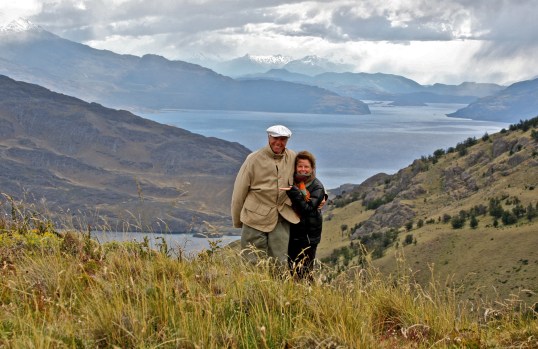
Kris Tompkins and her late husband, Douglas Tompkins — renowned conservationist, founder of The North Face and cofounder of Esprit — overcame controversy and adversity to to save a Patagonian paradise.
Now others can learn how they did it.
In a major gift to Stanford University Libraries, the couple’s archives will reveal the personalities and politics that led to the astonishing creation or expansion of 15 national parks, protecting 14.8 million acres of land and 30 million acres of ocean in Argentina and Chile.
The materials, now being shipped to campus for scholars to study, “are a prototype for others to consider as we try to do more conservation in more places around the world,” said Stanford librarian Michael Keller.
“They show us the way, in both tactical details and strategic directions, to convince governments to invest more in conservation — and to understand the benefits both to their citizenry and also the climate,” he said.
Donated by the nonprofit Tompkins Conservation, the archives come as environmentalists race to confront the global crises of climate change and biodiversity loss.
“We hope they will inspire brilliant students from all fields to work for a more wild, equitable, and beautiful planet,” said Kristine McDivitt Tompkins, the former CEO of the outdoor-apparel company Patagonia, in a statement.
The conservation efforts by Doug and Kris were initially met with fierce local opposition and suspicion.
Doug fell in love with Patagonia in the early 1960s during a backpacking trip through South America. Chile is heavily dependent on oil drilling and logging, which put the landscape at risk — and he wanted it saved.
Leaving their corporate careers behind, they devoted all their savings to buying parcels of land — hundreds of thousands of acres at a time — and removed livestock, fencing and invasive species, sometimes using intermediaries to avoid price inflation.

The vision was to create national parks — on the scale of Yosemite, Yellowstone or Grand Teton — that would be gifted to the Chilean and Argentine governments. Their holdings included the 726,488-acre Pumalín Park, the world’s largest private nature reserve.
But wildland philanthropy was unknown in Latin America, and their acquisition of land on this scale was not welcomed. Some saw it as land grab by foreigners. Others suspected ulterior motives, such as control of the region’s water, minerals and other natural resources.
Doug died in 2015 of severe hypothermia after a kayaking accident in Chile. He and five others — including Yvon Chouinard, founder of the Patagonia clothing company — were on a week-long trip when gusting winds and fierce waves overturned his boat on Lago General Carrera, a lake separating Chile from Argentina.
Yet Kris doubled down on conservation efforts, tapping into her managerial instincts to collaborate with the government, local communities, scientists and other philanthropists to keep projects moving forward.
Her efforts resulted in a historic deal in 2018, when Tompkins Conservation finalized an agreement with the Chilean government to donate over a million acres of their preserved and restored territory to Chile.
In exchange, the government committed additional land to create a Patagonian national park network.
It has served as a historic model for how to join public and private efforts to conduct large-scale conservation. The Chilean government posthumously awarded Doug honorary citizenship.
The story is told in Wild Life, a 2023 documentary film by Elizabeth Chai Vasarhelyi and Jimmy Chin, the Oscar-winning duo behind “Free Solo,” released by National Geographic Documentary Films and available on Hulu.
And the work continues. Among other projects, Tompkins Conservation is now conducting “rewilding” efforts, reintroducing jaguars, red-and-green macaws, giant anteaters and other rare species to the region, which stretches from Hornopirén, 715 miles south of the Chilean capital of Santiago, to Cape Horn, on the southern tip of the continent.

The nonprofit selected Stanford because of the San Francisco Bay Area’s longstanding commitment to environmentalism, said Carolyn McCarthy of Tompkins Conservation. Kris’s father was a Stanford grad. The North Face was founded in San Francisco; The Grateful Dead played at the store’s grand opening.
The university’s library is already home to the archives of other famed individuals, ranging from novelist John Steinbeck and poet Alan Ginsburg to architect Buckminster Fuller, photographer Eadweard Muybridge and inventor William Shockley. It recently received extensive materials from the founding of the Mexican American Legal Defense Fund, a civil rights organization formed to protect the rights of Latinos in the United States.
“Though our work takes place at the tip of South America,” said Kris, in a statement, “our origins started in the Bay Area…Stanford has been formative in the education and values of my family. So, it’s fitting that the archives of Tompkins Conservation, Doug and myself, will be housed here.”
The materials include books, correspondence, legal files, interviews, photographs, videos and copies of grants that have been awarded to environmental activists, said McCarthy.
Stanford is already conducting extensive research in the region. Environmental Biology Professor Elizabeth A. Hadly studies plant and animal dynamics over the past 10,000 years, seeking to understand why temperate South America is less biodiverse than North America at the same latitude. Environmental Earth Science Professor Robert Dunbar is documenting the record of climate change in Patagonian lake sediment.
“There is still a lot more to be done,” said Keller. “But the fact that so much has been accomplished, on such a grand scale — that will be interesting to lots of people, and many governments.”

